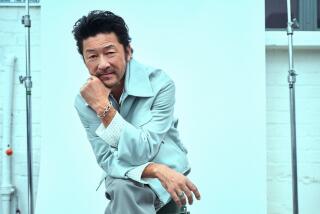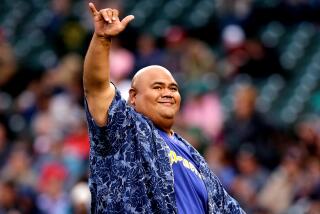American Wrestles Way to Top in Sumo : Sports: A cultural issue is put to rest as Hawaiian becomes first non-Japanese grand champion in the ancient sport.
TOKYO â He grew up in a rough Hawaiian neighborhood, caught chickens for the slaughterhouse as a sideline and has never once been to the U.S. mainland.
But now Akebono, otherwise known as Chad Rowan, 23, has won fame, fortune and international praise by doing what no foreigner has ever done before: He has reached the pinnacle of Japanâs arcane sumo world by becoming the first foreign yokozuna , or grand champion, in the sportâs 2,000-year history.
Akebono, whose massive trunk, attached to spindly legs, makes him sumoâs tallest man at 6-foot-8 and the second-heaviest at 466 pounds, will be formally awarded the title today by the Japan Sumo Assn. His promotion settles once and for all the controversial question of whether Japan, culturally possessive at times, would ever confer such a lofty title on a foreigner.
The issue brewed into an international incident last year when fellow Hawaiian wrestler Konishiki charged that he was denied the promotion because of racism. In fact, some Japanese commentators had publicly argued that foreigners lacked the requisite âdignityâ--a quality nearly as important as physical prowess--for sumoâs top award.
But Akebono, with his massive girth and reach, not to mention a modest demeanor and happy-go-lucky nature, answered all doubts about his qualifications by winning two straight tournaments and blasting his chief rival and sumoâs golden boy, Takahanada, out of the ring within seconds in Sundayâs final and decisive match.
âWe made the decision based on his dignity, character and power,â said Dewanoumi, chairman of the sumo association, after the Yokozuna Promotion Council unanimously recommended the title for Akebono on Tuesday.
Although some members questioned whether Akebono was seasoned enough--he came to Japan just five years ago and sat out two recent tournaments because of injuries--Dewanoumi said no one objected to his U.S. nationality.
Akebono, who worked hard to acquire conversational Japanese in just six months, belts out karaoke songs and likes most Japanese food except eel and sweet bean paste. He said he wants to be considered ânot as a foreigner but just as a wrestler gaining promotion.â
Indeed, when he first came to Tokyo, Akebono decided that the only way to conquer chronic homesickness was to divorce himself from things Hawaiian and immerse himself in sumo and in Japanese culture. He would even decline offers from his aunt to deliver Hawaiian foods or goods on her stopovers in Tokyo, said Gerry Ramirez, a Northwest Airlines flight attendant.
âHe said it would just make him want to go home,â Ramirez recalled. âHe said he had come to Japan to do a job and that he would do the best he could.â
That personal discipline was evident at an early age, when he avoided problems with truancy and shoplifting, not uncommon among his contemporaries in the rough neighborhood of Waimanalo on the windward side of Oahu, said Al Torres, his uncle. Akebono probably had little choice: His mother, Janice Rowan, raised her eldest of three sons with love--she calls the sumo behemoth âmy babyâ--but also strict discipline and a strong religious upbringing as a Jehovahâs Witness.
Akebonoâs mother enforced midnight curfews by locking her boys out for the night. She called the parents of girls hanging around the house to confer about the propriety of their children dating each other. She also transferred Akebono from the local high school to one in a better part of town.
In return, he cleaned house for her and always had the rice cooked by the time she came home from her job as a U.S. Department of Education administrator. When he first moved to Japan, the two would cry together on the phone because they missed each other so much, Torres said.
Akebonoâs relatives, in fact, were worried that he was too gentle for sumo when he abruptly announced one day that he had decided to join his Uncle Larryâs friend, Jesse Kuhaulua, in Japan. Kuhaulua, Japanâs first American sumo wrestler, became a Japanese citizen and now runs a sumo stable under the name Azumazeki. He lured Akebono to Japan after a basketball scholarship at Hawaiiâs Pacific College didnât seem to be working out.
âFor Chadâs size, he didnât have that crazy anger--he would go off on the side and suffer by himself,â said Torres, who came to watch his nephewâs tournament along with his wife, Maydelle, and Ramirez. âHe didnât have that mean streak, and in sumo you have to fight back.â
âItâs rotten at first,â Akebono has said in past interviews, referring to the grueling practice, the all-male communal living and the feudalistic system where junior wrestlers serve as virtual indentured servants with no salary and the lionâs share of household chores.
Stable master Azumazeki, taking stock of Akebonoâs top-heavy build and initial inability even to do basic sumo squats, confessed to wondering âif heâd ever be able to wrestle.â
But relying on a fellow Hawaiian and stablemate named Takamio as a mentor and guide to the sumo life, Akebono persevered with few public complaints. He learned to fight back and cultivate one of the more intimidating glares in sumo, after confessing to his aunt that he âdidnât like getting beat on.â
Yet, glimpses of his private side show that he hasnât lost his sunny nature.
On a recent morning, after solemnly ending the practice session with a ritualistic circling of the sumo ring, Akebono clambered downstairs, turned up some rap music full blast and jammed wildly to the beat in his cotton kimono.
That dayâs antics also included spitting water on some of the junior wrestlers and grabbing a spectatorâs camera with orders to his cohorts to line up and say, âCheese.â
But Akebono also âhelps look after the junior wrestlers,â said one of them, 21-year-old Takamihana, and at a recent practice, the American earnestly coached two of his fellow Hawaiians. He also plays video games with them, treats them to shabu shabu beef dinners and takes them to the local karaoke bar.
A onetime aspiring baker known for his lemon and coconut cakes, Akebono will receive a $15,000 monthly salary in his exalted yokozuna status.
President Clinton is expected to send Akebono a congratulatory telegram. Anticipating a meeting between the two titans in their respective fields, the Sports Nihon tabloid plastered its front page with a giant photo of Akebono, a smaller one of Clinton and the bold headlines: âTop Encounter,â and âAn American Dream Comes True in Japan.â
Chiaki Kitada, a researcher in The Timesâ Tokyo Bureau, contributed to this report.
More to Read
Go beyond the scoreboard
Get the latest on L.A.'s teams in the daily Sports Report newsletter.
You may occasionally receive promotional content from the Los Angeles Times.











